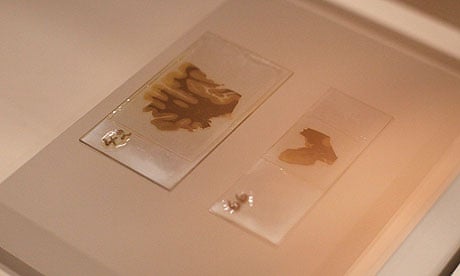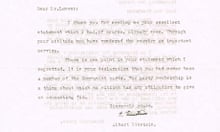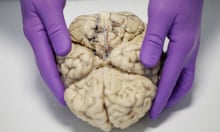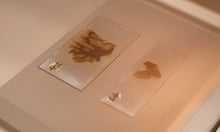Sections of Albert Einstein's brain are going on display in Britain for the first time this Thursday in an exhibition of notable examples of human grey matter.
When the physics genius died aged 76 in 1955 his brain was divided into sections, two of which are going on show at the Wellcome Collection show Brains: The Mind As Matter.
The two slides from Einstein's brain are on loan from the Mutter Museum in Philadelphia, where they were shown publicly for the first time in the US last year.
Einstein was cremated and his ashes were scattered according to his wishes. But the pathologist Thomas Harvey, who carried out the postmortem, said Einstein's son gave him permission to preserve the brain for research, a claim that was later disputed.
Harvey kept the brain, which to many people's surprise was not particularly large, and divided it into 240 sections preserved in jars of formaldehyde at his house. He gave a box of 46 slides to his colleague William Ehrich, and the samples were eventually donated to the museum in Philadelphia.
The 19th-century murderer Edward Rulloff's brain – one of the largest ever known – is also on display for the first time in Britain. Rulloff is thought to have killed his wife and child and was sentenced to death in 1871 for killing a shop assistant in New York.
The exhibition also features the brain of the US suffragette Helen Gardener, which she donated to science to disprove theories about gender, the brain of an ancient Egyptian, one of the oldest known specimens, the brain of the computer science pioneer Charles Babbage (1791-1871), and a brain specimen containing a bullet wound.
The show's co-curator Lucy Shanahan said the slides of Einstein's brain raised questions about brain collecting, donation and consent and "the desire to establish whether there is something significant or different about the brain of a genius".
The guest curator Marius Kwint said: "Brains show how a single, fragile organ has become the object of modern society's most profound hopes, fears and beliefs, and some of its most extreme practices and advanced technologies.
"The different ways in which we have treated and represented real, physical brains open up a lot of questions about our collective minds."
Brains: The Mind As Matter opens on Thursday and runs to 17 June.







